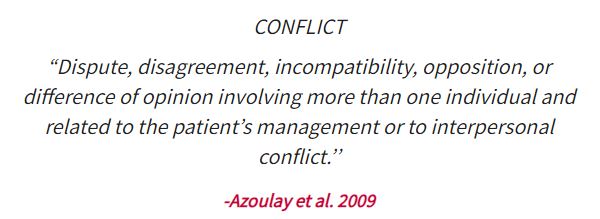
Diagnosing Conflict (IHP)
The "Closed" Case
Watch the following video about a conflict that happens between medical team members in an operating room. We will revisit this case throughout the module. (1:18)
Importance of Diagnosing Conflict
Conflict is a common occurrence in healthcare settings. In a large study, 70% percent of Intensive Care Unit (ICU) workers reported conflict with the majority of the conflict being intrateam and not with patients or family (Azoulay et al., 2009). Additionally, between one and four conflicts occur during each operation. Conflict affects team function, job satisfaction, contributes to reduced quality of care, and can produce harmful patient outcomes.
Therefore, diagnosing and resolving conflict is essential. Doctors & Nurses prefer to solve conflict with informal methods, meaning they do not want to include an expert mediator (Azoulay et al., 2009). Knowing that Doctors and Nurses prefer to solve conflict informally should lead to more training in the area; however, most training programs do not include training in conflict management. Health professionals often say, “I never learned about any of this in my training, and yet it’s a skill I need almost daily”.
Additionally, many providers are in leadership roles and do not necessarily understand how their role can both positively and negatively affect conflict outcomes.
| Unresolved Conflict | Constructive Conflict |
|
|
Target Audience
This program is intended for:
- Physicians Assistants / Associates (PA)
- Physicians
- Nurses/Nurse Practitioners
Learning Objectives
At the conclusion of this course, you will be able to:
- Recognize and differentiate conflict management communication modes.
- Identify conflict types and cultures and how each impacts dialogue.
- Discuss conflict scenarios and factors that affect dialogue.

Bobbie Ann Adair White:
Dr. Bobbie Ann Adair White is an educator, coach, and consultant. Acting as a learning mediator and coach, BA teaches in the following content areas: conflict management, teams in medicine, leadership and educational administration, and health professions education.
Her formal education consists of a Bachelor of Arts in psychology with a minor in sociology, a Master of Arts in industrial and organizational psychology, and a doctorate in educational leadership with a dissertation entitled “Conflict Management Education as a tool for Leadership Development in the Intensive Care Unit”.
BA serves as an Associate Professor within the Health Professions Education program at MGH IHP and Vice Chair for Faculty Development and Research at Baylor Scott & White Health’s Department of Surgery in Temple, TX .
Development of this course was supported by additional contributors at the MGH Institute of Health Professions: Ginny Do, Sarah Love, Greg Moore, and Megan Wilcox.
The planners and faculty of this educational activity have no relevant financial relationships with ineligible companies to disclose.

 Facebook
Facebook X
X LinkedIn
LinkedIn Forward
Forward